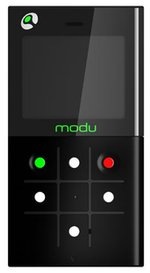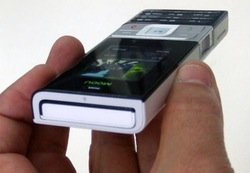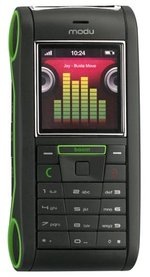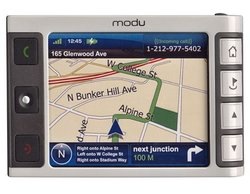 The Modu modular cell phone is a really interesting idea. Its timing may be perfect, or not. It may spawn its own ecosystem, or not. It’s design, interface, and support products may hit the bulls-eye, or be total cheese.
The Modu modular cell phone is a really interesting idea. Its timing may be perfect, or not. It may spawn its own ecosystem, or not. It’s design, interface, and support products may hit the bulls-eye, or be total cheese.
But you’ve got to give Israeli startup Modu credit for trying something different. Modu is introducing a tiny modular phone that can be slipped into different “jackets” to give the base phone additional features and functions depending on the user’s needs.
Basic “jackets” may include an MP3 sleeve, turning the phone into a digital music player. Or a GPS device. Or a digital camera for wireless image transfers. Or an alarm clock interface. Or with a larger screen, a video playback device. The possibilities are plentiful.
The phone module weights just 1.3 ounces and is smaller than a credit card. It will launch Oct. 1 with mobile carriers in Russia, Italy, and Israel, but not in the U.S. or elsewhere in Europe at this time. It will be on display next week at the Mobile World Congress in Barcelona.
 Modu is expected to sell in a ”jacket” bundle for about $280, a price that most likely will change depending on carrier subsidies. An initial “jacket” may be an MP3 sleeve. Additional “jackets” may cost between $20 and $80 and could be bought almost anywhere — electronics stores, airports, bookstores.
Modu is expected to sell in a ”jacket” bundle for about $280, a price that most likely will change depending on carrier subsidies. An initial “jacket” may be an MP3 sleeve. Additional “jackets” may cost between $20 and $80 and could be bought almost anywhere — electronics stores, airports, bookstores.
At introduction, the Modu will use GPRS, or General Packet Radio Service, for data transfer, a slower technology that’s similar to dial-up Internet access. It’s expected that Modu will be updated to 3G technology, and it does not initially have Wi-Fi capabilities.
“We’re going to change the cellular market,” Modu founder Dov Moran told Reuters.
 “This is the tip of the iceberg,” Moran told BusinessWeek. “This is a new way to provide communications capability to any device.”
“This is the tip of the iceberg,” Moran told BusinessWeek. “This is a new way to provide communications capability to any device.”
Investors are interested. Moran, who founded a flash memory business that he sold to SanDisk for $1.5 billion in 2006, has received investment funding from SanDisk, Genesis Capital, and Gemini Capital Fund Management totalling $20 million. Moran hopes to secure another $100 million this year.
Modular cell phone designs are nothing new. They’ve been around design schools and industrial design houses for years, although concepts for these phones have gone nowhere because wireless carriers — particularly in the U.S. — are not interested in offering modular phones to their customers. At least not yet.
But the modular phone is continuing to evolve, with Asian cellular carrier Willcom introducing a modular handset in 2006; it comes with six pieces, including GPS and a camera that can snapped on or off as needed. Bug Labs, another startup, plans to introduce up to 20 different interconnecting consumer electronic modules. Sony Ericsson also has a patent on a modular phone.
 As with most products, it’s a matter of timing. Do cell phone users want flexibility to pop their phones into a dashboard player in their cars for hands-free operation and GPS? Would they want to slip their phones into an MP3 sleeve for digital music playback? Would they want to change the look of their phones by season or by what they are wearing that day?
As with most products, it’s a matter of timing. Do cell phone users want flexibility to pop their phones into a dashboard player in their cars for hands-free operation and GPS? Would they want to slip their phones into an MP3 sleeve for digital music playback? Would they want to change the look of their phones by season or by what they are wearing that day?
Current trends suggest not. For one, personalization and customization of cell phones — changeable faceplates, phone “jewelry” — seems to be waning, or at least leveling off. So having the ability to change Modu “jackets” based on what you’re wearing or what season it is may be more 2003, not 2009.
Additionally, consumers are showing more interest in smart phones such as Apple’s iPhone and Research In Motion’s Blackberry line of products. Smaller fashion phones may be declining (look at Motorola’s recent troubles), while slightly larger information devices may be rising.
But if the fit and finish of the Modu modular phone is more iPod than cheap Chinese knocks-offs, if a quality ecosystem develops around Modu like iTunes and iPod accessory makers have for the iPod, then Modu has a chance for success and might invent another cell phone market — fashion, information, and modularity.

I still think this is an interesting idea – if it’s done right.
In the core it needs:
Wifi, 3G, very basic functions.
In the shells I want:
* Basic phone for one
* Smartphone
* Laptop/UMPC style thing.
If it’s something they can make communicate well with extra processing power in these other shells – then I could see that working well.
I’d love to have a device I can scale up or down in terms of size and capability depending on what i’m doing. It also means i’d never have to worry about syncing anything – there is stuff I have on my computers I definitely don’t want “in the cloud” per se and this way… I can make sure its still available on whatever i’m carrying at the time.
That being said, I think the idea of an alarm clock or similar thing is a bit of a farce.
It would be better to have it communicate with such a device over bluetooth or whatever. Then it doesn’t have to be physically disconnected from whatever other device i’m using it in just to use a more specific (though more restrictive) function.
I totally agree with Mr. Crash! 🙂
I think this is a great idea that will have success in Europe Middiel East and Africa (EMEA) but will never be seen in the USA. US mobile phone carriers have no interest in giving their customers choice.